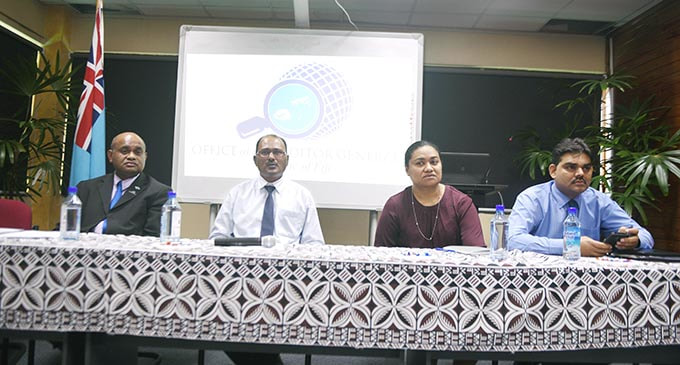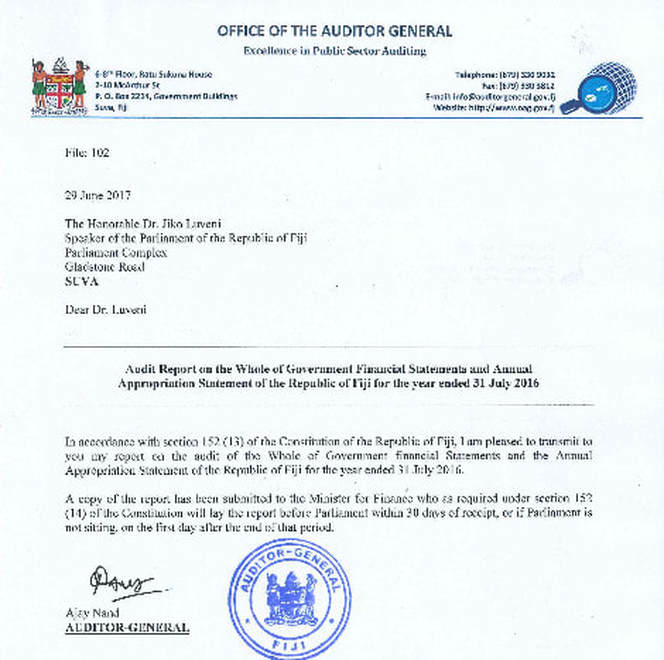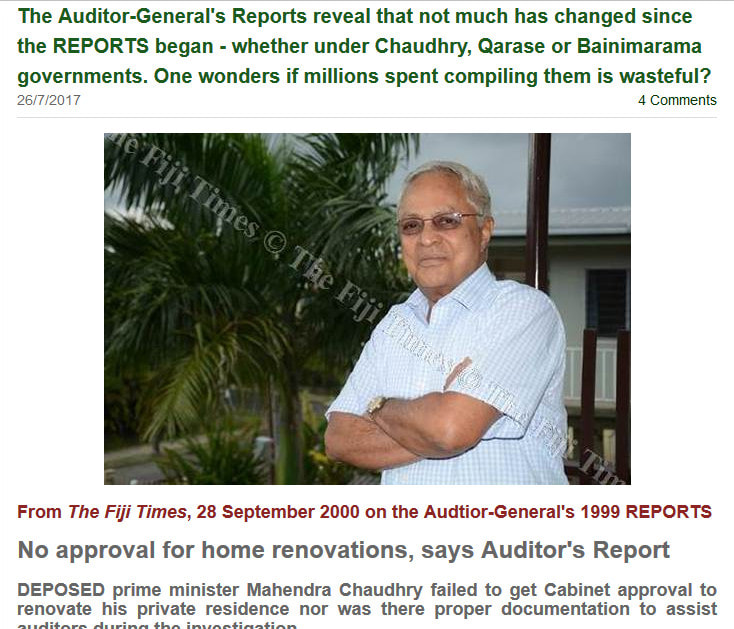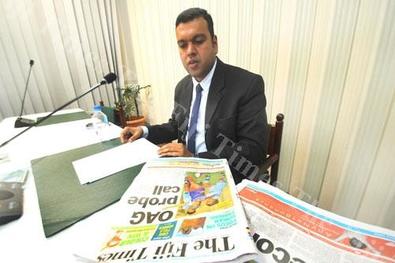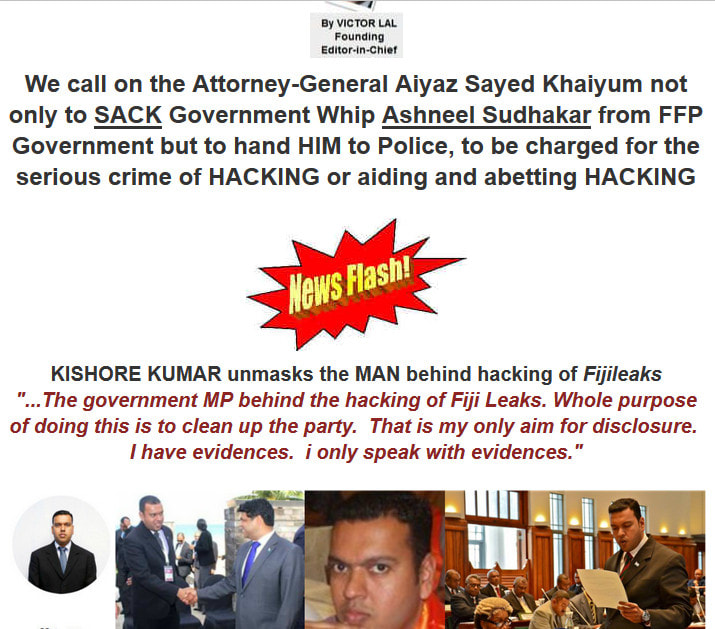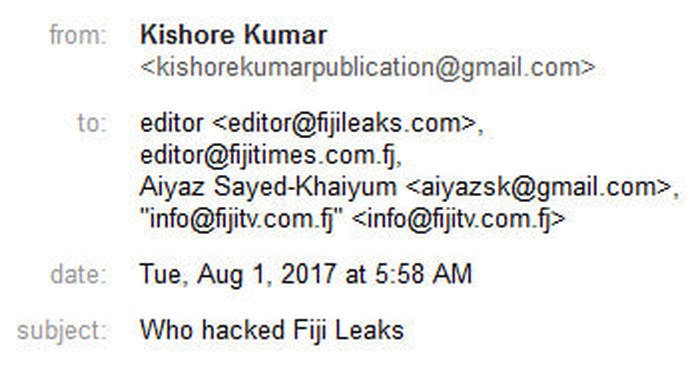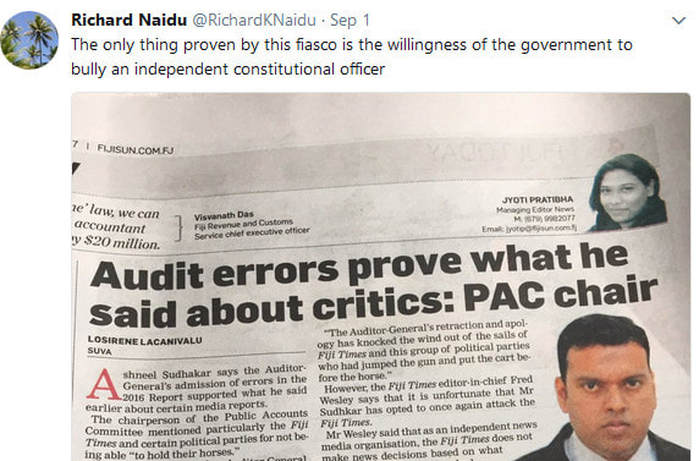“I would like to sincerely apologise to the Fijian people for the errors in the 2016 report and I wish to assure the Fijian public that this will not happen again under my watch.”
Fijileaks: One of his critics is COUPIST and SODELPA leader Sitiveni Rabuka. Maybe it is time the new Auditor-General Ajay Nand released the report he and his team had prepared on the National Bank of Fiji which linked Rabuka and his thieving associates to the bank's destruction
Why did the Auditor-General sign the 2016 REPORT? Now, by tendering his grovelling apology at a press conference, he is seen as
a blundering "FOOL" and a regime "STOOGE". He was appointed as the new sheriff to scrutinize State expenses, and was expected to keep his distance from the Government of the day!
Was Nand browbeaten to make a humiliating public apology for mistakes on the part of the Ministry of Finance under Khaiyum's portfolio?

Auditor-General Ajay Nand yesterday (31 August 2017) apologised for glaring errors in the 2016 report.
Unfortunately, for the 2016 report, certain media and others had made observations and arrived at conclusions before the proper scrutiny of the Public Accounts Committee.
He said these observations and conclusions had been based on the misinformation in the report.
He said: “I would like to sincerely apologise to the Fijian people for the errors in the 2016 report and I wish to assure the Fijian public that this will not happen again under my watch.”
He said the errors arose because of the archaic audit practices within the Office of the Auditor-General.
Mr Nand said the report in question was tabled in Parliament on July 11, 2017. He said it had a number of errors which needed to be corrected and clarified.
Mr Nand said he intended to review the capacity and capability of the staff at the Office of the Auditor-General.
“Reforms are underway to modernise the audit process and methodology and do away with archaic practices that do not enable the true audit position to be correctly reflected,” he said.
He thanked the Permanent Secretary for Economy, Makereta Konrote, and chief accountant for highlighting the errors in the report.
He highlighted the key errors in the 2016 report:
The 2016 report incorrectly highlighted the non-submission of audited accounts for some entities which amounted to a total value of $245.07 million; in fact, a number of draft accounts were already submitted to the Auditor-General’s Office and a number of agency reports have already been audited. I will provide a list to the media on this.
The statement that purchases worth $2,593,374 of ‘family packs’ for Cyclone Winston victims were not properly procured.
However, Mr Nand said this procurement was done in accordance with the Procurement Regulations 2010, which permits the Ministry to make such purchases during times of emergency.
The 2016 report states that the approval from the Ministry of Economy was not obtained by the Ministry of Women, Children and Poverty Alleviation in relation to budgeted purchases totalling $6,947,335.
Mr Nand said the Ministry of Economy, however, did not have the power to approve transactions for other Budget sector agencies; approval of transactions is granted by the relevant permanent secretary. The Ministry of Economy merely confirms the availability of funds in the budget for the agency.
The 2016 report raised an issue in relation to use of funds to the tune of $4,600,000 for the sugarcane replanting programme when the funds were earmarked for sugar rehabilitation post-Cyclone Winston.
Mr Nand said this was not an issue as the use of funds for the ‘Sugar Development Program’ (Head 35) for the purpose of cane replanting is within the ambit of the objective of the Sugar Development Program, which is to increase cane production.
The 2016 report raised the issue of missing share certificates with a value of $14,684,469 in relation to shares owned by the State.
Mr Nand said entities such as the International Finance Corporation and International Bank for Reconstruction and the Development did not issue share certificates, so such certificates could not be missing.
“This has been confirmed in writing by both organisations”. Moreover, third party confirmations were given by the State Owned Enterprises (SOE’s) advising the value of investment by Government. He said this gave the assurance and confirmation of Government’s investment as provided by the directors of SOE’s. He also said given that there were no new equity investment during the period report, the office, in line with the modern audit practices could have relied on the share certificates previously provided by the Ministry of Public Enterprises.
He said the public needed to know that the whole of the Government report was unqualified.
He said it meant there were no significant with the financial statements and “this finding remains the same.”
He stated that during his term as the Auditor-General he would ensure more professional and qualified people were appointed and that they engage in an open merit and recruitment selection process.
Mr Nand further said the office was working to improve all external and internal communications to ensure that the reports prepared by their office correctly reflected the true audit position of the Government’s account.
He added that the Auditor-General’s Office intended to compile a supplementary report to the 2016 report to correct the errors in the report.
He said he would table the report via the Attorney-General and Minister for Economy Aiyaz Sayed-Khaiyum at the next Parliament sitting so that when the public scrutiny took place it was not based on fundamental erroneous material. Source: The Fiji Sun, 1 September 2017
NFP: "We call on the Auditor General to stop any process of doing a supplementary report that is planned to be presented to Parliament...We believe the Auditor General was forced to hold a press conference to correct the so called anomalies in the Auditor General’s Reports. It is unprecedented and unethical for the Auditor-General to reveal so-called anomalies in the Reports of the Auditor-General through
a press conference."

---------------------------------------
We believe the Auditor General was forced to hold a press conference to correct the so called anomalies in the Auditor General’s Reports.
It is unprecedented and unethical for the Auditor-General to reveal so-called anomalies in the Reports of the Auditor-General through a press conference.
We firmly believe the Reports will be sanitised before being re-tabled in Parliament.
The fact that the Auditor- General revealed the supposed anomalies in a press conference in the presence of officials from the Ministry of Finance raises many questions. Why should they be present with the Auditor-General, which is an independent office?
When Reports of the Auditor General are compiled queries are directed to the Ministry of Economy or the relevant Budget Sector for comments and clarification. In the latest Audit General’s Reports those responsible for management of funds have either not commented or stated they will improve the procedures.
It is apparent that the Ministry did not clarify these matters or was in agreement with the Auditor General.
Furthermore, any anomalies can be clarified through scrutiny before the Public Accounts Committee. The Ministry appears before the Committee and provides evidence. This has been the long standing practice. This is the forum where clarifications and corrections are made before PAC submits its Report to Parliament after intense scrutiny.
We therefore find this totally unacceptable, unethical, in violation of audit practices and a hammer blow to transparency and accountability.
We call on the Auditor General to stop any process of doing a supplementary report that is planned to be presented to Parliament.
Professor Biman Prasad
NFP Leader
FLP: "A few errors in the audit of government reports pointed out by the Auditor General yesterday does not mean that the entire 2016 report of the Auditor General stands tainted"
A few errors in the audit of government reports pointed out by the Auditor General yesterday does not mean that the entire 2016 report of the Auditor General stands tainted, says Labour Leader Mahendra Chaudhry.
FLP understands that the errors were probably due to circumstances beyond the Auditor General’s control and that he may have been under some pressure to issue a statement.
“It is a question of accountability and transparency in the expenditure of public funds. The Fiji First government has a dismal record in this area as amply revealed through all Auditor Generals reports since 2009. The 2016 report was no exception,” Mr Chaudhry said.
He asked why the Accountability and Transparency Commission, provided for in the Constitution with powers to investigate financial irregularities, has not been appointed even some four years after the constitution was imposed?
“This is a serious lapse on government's part, pointing to a dereliction of duty. The same applies to the Code of Conduct and Freedom of Information legislations both of which, although constitutional requirements, remain unactioned,” Mr Chaudhry said.
“Opposition parties in parliament must do much more than what they have so far demonstrated in holding the Bainimarama government accountable. It can hardly be said that these lapses on the government's part are coincidental.
“It seems that there is a deliberate reluctance to comply with the requirements that impose financial accountability on the government. This must also be noted by donor governments which provide millions to Fiji as development assistance.
"The COP23 and climate change funds being actively solicited by the Bainimarama government may run the risk of being abused unless rigid compliance and accountability standards are insisted on by the donor governments and aid agencies,” Mr Chaudhry warned.
